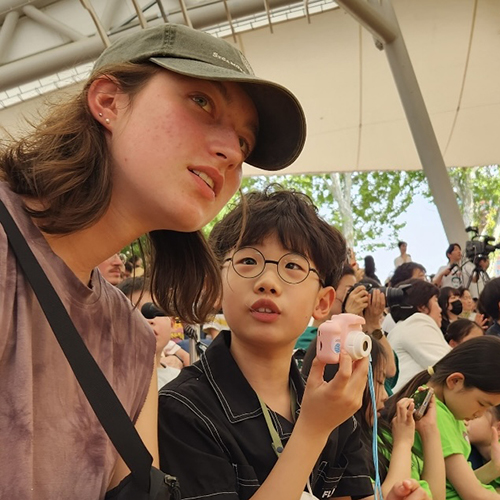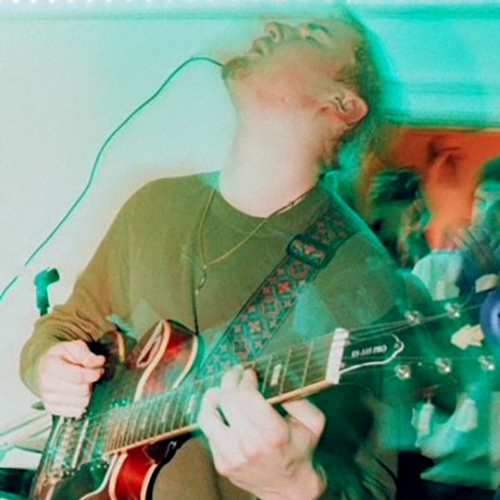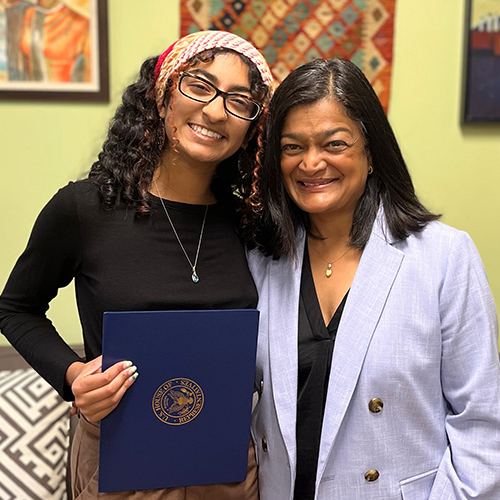When Mary Kollar (B.A., ‘65; M.A., ‘81) watched the last presidential election unfold, she became increasingly distressed by the way politicians were “twisting, mangling, and injuring” the English language. She decided to stage a protest—with poetry.
Kollar made copies of the poem “October,” by Robert Frost, and put them in a plastic envelope taped to the front gate of her home. The idea, she says, was to share the beauty of carefully crafted language.
The poem was intended as a one-time offering, but the next month Kollar couldn’t resist sharing “November,” an anti-war poem also by Frost. Then passersby began asking for a poem for December. “That’s when the schoolteacher in me really kicked in,” says Kollar, a retired high school English teacher and alumna of the UW Department of English.

Before long Kollar had installed a wooden poem box built by her brother, and was placing hundreds of copies of a poem in the box each month. She hasn’t missed a month since the box was installed more than three years ago.
“I put out about 200 copies each month, in batches of 20 to 50,” says Kollar. “I’m always surprised when the box is empty.”
Often Kollar sees people take a sheet as they pass her house on Seattle’s Capitol Hill. Some are joggers, some are neighbors, some are parents walking their children to school. She also has seen cars stop so that a passenger can run out and grab a copy of the poem. It is, she says, a fascinating turn of events.
“When you think about it, anyone who wants to read a poem can open a book,” says Kollar. “So why are they so interested in getting it out of a box when they’re walking by? Who knows?”
Kollar’s own fascination with poetry dates back to high school, when an English teacher had the class read a collection of Robert Frost poems. “I’d never studied poetry before,” she recalls. “I found it hard and intriguing.”
Frost remains one of Kollar’s favorite poets and has made several appearances in the poem box. But she tries to balance her selections, striving for a range of styles that reflects the diversity of her readers. Selected poets have included legendary UW professor Theodore Roethke, Mona Lisa Saloy (while Saloy was a visiting artist at the UW), and Chilean writer Pablo Neruda, whose poem she printed in English on one side of the sheet and in Spanish on the other.
Kollar rarely provides a tutorial along with her monthly poem, but she did add a few comments at the bottom of last December’s selection. The poem was Robert Frost’s “Stopping By Woods on a Snowy Evening,” which she had long resisted placing in the box. “I thought it was too common,” she admits. “Everyone has had an experience with that poem. Yet people often read it in a shallow manner. There are many ways to appreciate its complexity.”
As Kollar describes the poem’s interlocking rhyming scheme—in which the minor rhyme of the first verse becomes the major rhyme of the second verse— and its abundance of rich vowel sounds, her fascination with language is evident. “When I put poems in the box, I try to keep the English teacher out of it and let the poems speak for themselves,” she says. “But it’s hard.”
That’s understandable, considering Kollar taught high school English for nearly 30 years, including 12 years at Bothell High School and 10 years as chair of the English Department at Woodinville High School. She also worked with the Puget Sound Writing Project and served as co-director of the Center for Capable Youth (now the Robinson Center for Young Scholars)—both UW programs—before retiring in the mid-1990s. She continues to spread the gospel of poetry, teaching classes at senior centers and volunteering in elementary schools. “Have you ever taught poetry to a kindergarten class?” she asks, her eyes widening. “Oh my. That’s difficult.”
Kollar and her husband Allan (‘76) are also supporting education through gifts to the UW. Together they created a fellowship for students studying American art and literature. Mary recently created a second fellowship in the English Department, the Mildred Cartwright Hainer Fellowship, in honor of her mother. The Kollars hope this fellowship will assist with graduate study for students who aspire to teach English in the schools.
While these gifts are satisfying, Mary still gets a kick out of reaching out to people through the poem box—and occasionally hearing back from them. She has many stories of thank you notes left in the box or visitors eager to chat when they see her outside. One of her favorite moments was when a jogger, employed at nearby Group Health, came to the door. “She wanted me to know that she gets the poem each month and reads it aloud, by cell phone, to her mother,” recalls Kollar. “The mother, who lives in an assisted-living facility in Massachusetts, has started a poetry group there that starts with my chosen poem and then researches that poet and his or her other poetry.”
Kollar’s efforts have also inspired others to create poem boxes. Guy Holliday, who lives several blocks away, now has a box through which he shares poetry he has written. Profiled in the Seattle Post-Intelligencer, Holliday credited Kollar with sparking the idea.
“Talk about imitation being the sincerest form of flattery—I think it’s great,” says Kollar. She adds, clearly amused by the attention, “I think this is wonderful. It was never meant to be a big deal.”
More Stories

Finding Family in Korea Through Language & Plants
Through her love of languages and plants — and some serendipity — UW junior Katie Ruesink connected with a Korean family while studying in Seoul.

Celebrating Contemporary Indigenous Music
Markus Teuton, a musician and citizen of Cherokee Nation, explores contemporary Indigenous music through his academic work and as host of “Indigenous Jazz,” a radio show.

Learning Hard Truths Through Internships
Sana Shetty, interested in human rights law, has a more nuanced understanding of potential careers thanks to internships.